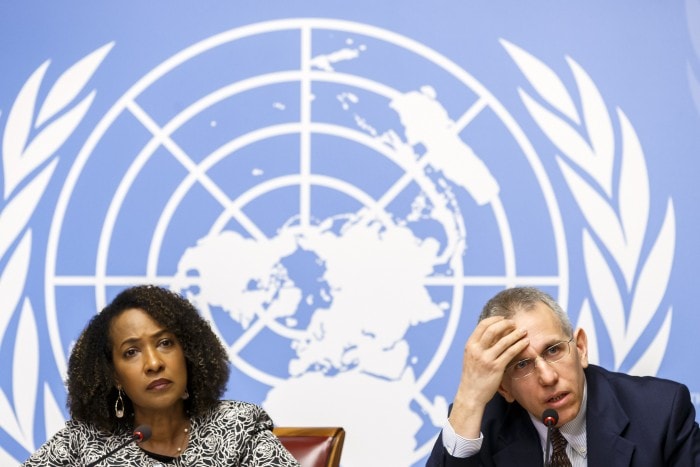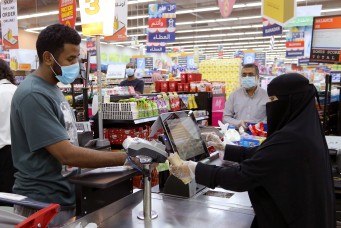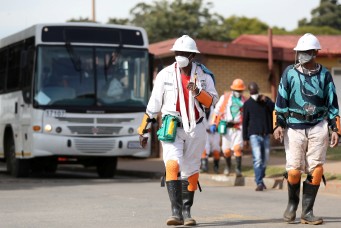Sustainable Solutions for an Economic Crisis
As the world grapples to mitigate a looming economic crisis, a roadmap already exists: the United Nations Sustainable Development Goals.

Pamela Coke-Hamilton (L), Director of the Division on International Trade and Commodities at the United Nations Conference on Trade and Development, UNCTAD, and Alessandro Nicita (R), Economist of the Division on International Trade and Commodities of the UNCTAD, present an UNCTAD’s analysis on the impacts of the new coronavirus SARS-CoV-2 on global value chains, during a press conference, at the European headquarters of the United Nations in Geneva, Switzerland, 04 March 2020. EPA-EFE/SALVATORE DI NOLFI
The COVID-19 pandemic has had dramatic impacts on the world economy. On April 14, the International Monetary Fund (IMF) predicted the worst economic downturn since the Great Depression, amidst expectations that the global economy will contract by 3 percent in 2020. The IMF is currently responding to calls for emergency financing from 102 countries, and has already approved immediate debt service relief to twenty-five countries under the Catastrophe Containment and Relief Trust (CCRT). Public borrowing in the Western world is set to reach levels unparalleled since 1945, as governments provide direct assistance to millions of households and companies to enable them to survive the current crisis.
In a webinar titled “The Global Economic Effects of COVID-19” and held by the American University in Cairo’s (AUC) School of Global Affairs and Public Policy (GAPP) on April 29, Mahmoud Mohieldin, who is the United Nations (UN) Special Envoy on Financing the 2030 Agenda for Sustainable Development, outlined the primary challenges facing the global economy as well as potential pathways for recovery. The webinar was hosted by Nabil Fahmy, Founding Dean of GAPP, and moderated by Ibrahim Awad, Professor of Practice and Program Director at the AUC Center for Migration and Refugee Studies.
In identifying the main economic challenges arising from the pandemic, Mohieldin placed the issue of debt accumulation high on the list. While many prominent economists—including Nobel laureate Paul Krugman—have warned against deficit alarmism, Mohieldin noted that such comments were applicable to the United States, but not to the rest of the world. While the United States controls its debt currency issuance, the same cannot be said of countries in the developing world, nor of smaller economies within the eurozone. All the more, initiatives put forward by the G20 and implemented by international financial institutions only deal with public, not private, debt, and are primarily geared towards low-income and International Development Association countries. The issue of household debt, Mohieldin warned, also remains a major concern.
Mohieldin also highlighted the disruption and potential restructuring of global value chains as another predictably lasting effect. Earlier this year, Chinese government measures to contain the coronavirus outbreak included the closing of many production sites to reduce contact between individuals and limit risks of infection. As a result, industrial production in the country fell by 13.5 percent in January and February combined compared with the previous year, while exports dropped by 17 percent.
“We have been witnessing an eastward shift in the global economic center of gravity since the 1980s,” Mohieldin said.
In light of current circumstances, however, government officials in a number of Western countries have called for “small sacrifices in cost efficiency to guarantee greater security.” We may witness an increased diversification of global supply chains as some firms relocate their activities to various new locations across the Asian and African continents.
Yet, Mohieldin cautioned that we may also witness an increasing turn toward populism and the implementation of protectionist measures, which he argues would place significant constraints on trade, investment, and labor movement. As migrant workers are already among the most vulnerable to loss of employment and wages in the current crisis, the World Bank projects a 19.7 percent decline in remittances to low- and middle-income countries (LMICs) in 2020—the sharpest in recent history. This would be of particular threat to LMICs, where remittances represent a significant percentage of gross domestic product and are lifelines for many vulnerable households. It is all the more crucial in light of the expected decline in foreign direct investment in the wake of the pandemic.
Fahmy observed a discrepancy between rates of economic contraction in the developed and developing worlds, to which Mohieldin responded by noting that economic growth rates are typically higher in developing economies and that a single percentage point increase in a eurozone country or in the United States is equivalent to a much higher increase within a developing economy. He went on to explain that Western economies had been harder-hit by the crisis, attributing this fact to stricter lockdown measures and to the primacy of the services sector, which has been more severely impacted than the agricultural and manufacturing sectors.
Nonetheless, Mohieldin expressed deep concern as to the impact of the crisis on the Arab World, citing the losses experienced as a result of the staggering drop in oil prices brought on by the pandemic. Indeed, from January to mid-March 2020, the region lost nearly $11 billion in net oil revenues, a number which, according to UN Economic and Social Commission for West Asia (ESCWA) projections, may reach $42 billion by the end of this year. ESCWA further projects the loss of at least 1.7 million jobs, resulting in a 1.2 percent increase in regional unemployment.
In his discussion of potential pathways to recovery, Mohieldin touched upon the obstacle that the general climate of uncertainty poses to strategic planning: “It is difficult to implement strategy in such volatile and uncertain times. The moment we are living through is one of those very unique moments when the life and safety of a person is in direct opposition to the preservation of their livelihood.”
He cautioned that “the entire world is engaged in a battle to flatten the curve, but the social isolation measures required to do so are in direct opposition with what is required to keep the economy afloat”.
The former Egyptian investment minister is of the opinion that even the alarming IMF estimates for global economic contraction could soon prove to be conservative. As such, he advised, it is best to build all assumptions and policy frameworks with the worst-case scenarios in mind: “You can hope for the best, but you really should be prepared for the worst.”
He continued on to note that some of the worst-hit sectors are travel, retail, tourism, and entertainment, arguing that they will remain strongly impacted until at least 2021. Moving forward, he believes that governments should prioritize the provision of assistance to those sectors and of social protection to citizens most severely impacted by the recession. Mohieldin also touched upon the need to consider the introduction of some form of universal basic income (UBI), citing International Labour Organization (ILO) projections of 195 million job losses as a result of the pandemic and the potential implications of a forced industrial revolution.
On this matter, Awad relayed concerns voiced by ILO officials on whether the introduction of UBI would derail existing efforts to fight for the adequate remuneration of work and implementation of social protections for labor. Mohieldin responded saying that UBI should be introduced in addition to, not as a substitute for, government protections such as minimum wage, universal education, and healthcare coverage—to which Awad expressed his agreement.
Responding to an audience member’s question about how to best reconcile personal safety and economic recovery, Mohieldin cited U.S. Governor of Pennsylvania Tom Wolf’s suggested guidelines for a gradual reopening of the economy as some of the most viable: “You can close the economy with a hammer, but you must reopen it with a scalpel,” he added.
Mohieldin suggested the following guidelines: First, governments’ approach toward reopening the economy should be data-focused; a reopening should only be considered if there are less than fifty cases per one hundred thousand inhabitants. Second, some social distancing measures should still be applied, such as limitations on large gatherings. Third, social protections for vulnerable citizens must remain in place. Fourth, countries should work towards implementing the trace, test, and treat strategy adopted by the government of South Korea. Fifth, governments must take measures to ensure that individuals, companies, and institutions abide by the guidelines set in place for reopening. Last but not least, governments must confront the likeliness of a second wave and prepare adequately.
Lastly, Mohieldin pointed to the seventeen Sustainable Development Goals (SDGs) outlined in the 2030 Agenda for Sustainable Development, which was adopted by all UN member states in 2015, as key steps toward global economic recovery. “SDGs are basically the solution; they are about inclusive economic growth.” Mohieldin further denounced the widespread neglect of SDG Three, good health and well-being, by countries in both the developed and developing world.
Recovery, he argued, will inevitably necessitate the provision of universal health coverage, as well as increased investments in resilience, social protection, human capital, fiscal infrastructure, data systems, and climate and disaster relief in accordance with the comprehensive objectives outlined in the 2030 agenda.
Amina Abdel-Halim is associate editor at the Cairo Review of Global Affairs. Her work has appeared in Ahram Online, Al Ahram Weekly, the Cairo Review of Global Affairs, and the Cairo International Film Festival’s Daily Bulletin.
Read More




